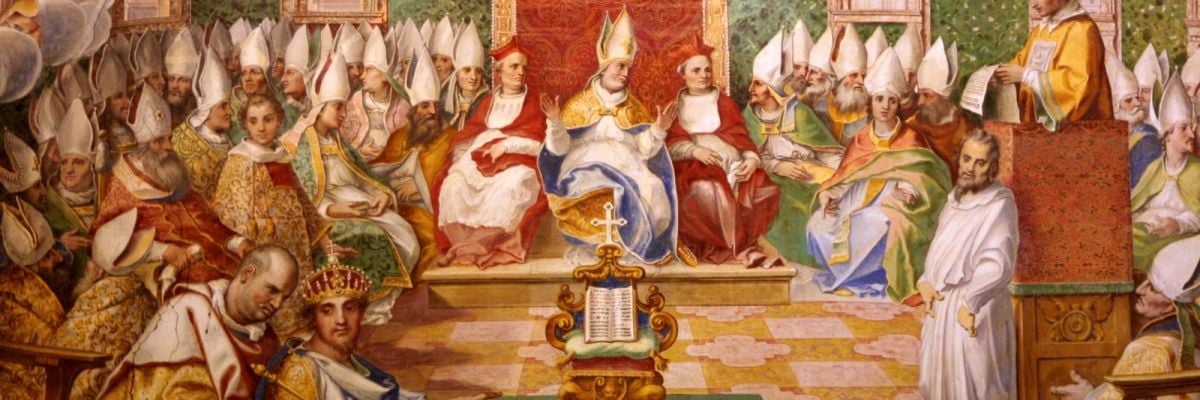
Aside from the first general gathering of the bishops of the Church—the Council of Jerusalem, which occurred around A.D. 50 (Acts 15) and which is usually not counted as an ecumenical council—there have been 21 ecumenical or general councils of the bishops of the Catholic Church. (The Eastern Orthodox Churches recognize the first seven as ecumenical councils.)
A council is recognized as ecumenical once its works are approved by a pope. The pope does not need to attend a council for it to be an ecumenical council. The earliest councils were held in the East, and the reigning popes usually sent legates to represent them. Later these popes approved the decrees of the councils, thereby verifying that they were ecumenical councils.
Some councils, such as Ephesus, have been mainly doctrinal in their work; others, such as Vatican II, have been mainly pastoral. Doctrinal definitions are capable of being promulgated infallibly; pastoral decisions, although binding, are not subject to infallibility.
1. Nicaea I
325
Pope Sylvester I, 314-335
Emperor Constantine, 306-337
Decisions: Condemned Arianism, which denied the divinity of Christ (elements of Arianism have reappeared in our own time); defined the consubstantiality of the Father and the Son; fixed the date for Easter; began formulation of Nicene-Constantinopolitan Creed.
2. Constantinople I
381
Pope Damasus I, 366-384
Emperor Theodosius, 379-395
Decisions: Recondemned Arianism; condemned Macedonianism, which denied the divinity of the Holy Spirit; completed the formulation of the Nicene-Constantinopolitan Creed.
3. Ephesus
431
Pope Celestine I, 422-432
Emperor Theodosius II, 408-450
Decisions: Condemned Nestorianism, which denied the unity of the divine and human in Christ; defined that Mary is the Mother of God (Theotokos), a doctrine denied by the Nestorians and by most of today’s Protestants; condemned Pelagianism, which held that man could earn his own salvation through his natural powers.
4. Chalcedon
451
Pope Leo the Great, 440-461
Emperor Marcian, 450-457
Decisions: Condemned Monophysitism (also called Eutychianism), which denied Christ’s human nature.
5. Constantinople II
553
Pope Vigilius, 537-555
Emperor Justinian I, 527-565
Decisions: Condemned the Three Chapters, writings tainted by Nestorianism and composed by Theodore of Mopsuestia, Theodoret of Cyr, and Ibas of Edessa.
6. Constantinople III
680
Pope Agatho, 678-681
Emperor Constantine IV, 668-685
Decisions: Condemned Monothelitism, which held Christ had but one will, the divine (this heresy arose as a reaction to the monophysite heresy); censured Pope Honorius I for a letter in which he made an ambiguous but not infallible statement about the unity of operations in Christ (an episode commonly used by anti-Catholic writers as an argument against papal infallibility, but for the real meaning, see Catholicism and Fundamentalism, pages 227-229).
7. Nicaea II
787
Pope Hadrian I, 772-795
Emperor Constantine VI, 780-797
Decisions: Condemned iconoclasm (which was mainly confined to the East), a heresy that held that the use of images constituted idolatry; condemned Adoptionism, which held that Christ was not the Son of God by nature but only by adoption, thereby denying the hypostatic union.
8. Constantinople IV
869
Pope Hadrian II, 867-872
Emperor Basil, 867-886
Decisions: Recondemned Adoptionism; deposed Photius as patriarch of Constantinople, thereby ending the Photian Schism, but this did not completely remove disaffections between the West and the East (in 1054 came the final break, when the Eastern Orthodox Churches broke away from unity with Rome).
9. Lateran I
1123
Pope Callistus II, 1119-1124
Emperor Henry V, 1105-1125
Decisions: Confirmed the Concordat of Worms (1122), in which the Pope and Emperor sought to end the dispute over investiture (the attempt by the secular powers to assume authority in appointing bishops; this was a main source of Church/state friction during the Middle Ages).
10. Lateran II
1139
Pope Innocent II, 1130-1143
Emperor Conrad III, 1138-1152
Decisions: Ended a papal schism by antipope Anacletus II; reaffirmed baptism of infants; reaffirmed the sacramental nature of the priesthood, marriage, and the Eucharist against Medieval heretics; decreed that holy orders is an impediment to marriage, making the attempted marriage of a priest invalid.
11. Lateran III
1179
Pope Alexander III, 1159-1181
Emperor Frederick Barbarossa, 1152-1190
Decisions: Regulated papal elections by requiring a two-thirds vote of the cardinals (see in this issue the article by Canon Francis J. Ripley, page 27); condemned Waldensianism and Albigensianism, a form of Manichaeanism (an ancient heresy that held that matter is evil; Albigensians opposed the authority of the state and of the Church, opposed the sacrament of matrimony, and practiced ritual suicide; despite these tenets, many anti-Catholics believe Albigensianism was the continuation of “real Christianity” during the Middle Ages and was a forerunner of Protestantism).
12. Lateran IV
1215
Pope Innocent III, 1198-1216
Emperor Otto IV, 1209-1215
Decisions: Ordered annual reception of penance and the Eucharist; used the term “transubstantiation” to explain the Real Presence of Christ in the Eucharist; adopted further canons against the Albigensians.
13. Lyons I
1245
Pope Innocent IV, 1243-1254
Emperor Frederick II, 1220-1250
Decisions: Excommunicated and deposed Frederick II for heresy and crimes against the Church.
14. Lyons II
1274
Pope Gregory X, 1271-1276
Emperor Rudolf I, 1273-1291
Decisions: Effected only temporary union of the Eastern Churches with the Roman Church; promulgated regulations for conclaves.
15. Vienne
1311
Pope Clement V, 1305-1314
Emperor Henry VII, 1308-1313
Decisions: Suppressed the Knights Templars; issued decrees on the reform of morals.
16. Constance
1414
Popes Gregory XII, 1406-1415
Emperor Sigismund, 1410-1437
Decisions: Ended the Great Schism, which involved three rival claimants to the papacy (see in this issue the article by Canon Francis J. Ripley, page 27); opposed the teachings of John Wycliffe, who taught sola scriptura, denied the authority of the pope and bishops, denied the Real Presence of Christ in the Eucharist, and wrote against penance and indulgences; condemned as a heretic John Huss, who denied papal authority and taught wrongly about the nature of the Church and who was burned at the stake in 1415 (in 1457 his followers established what became known commonly as the Moravian Church, which was the first independent Protestant church).
17. Florence
1438-1443
Pope Eugene IV, 1431-1447
Emperors: Albert II, 1438-1439
Frederick III, 1440-1493
Decisions: Reaffirmed papal primacy against claims of conciliarists that an ecumenical council is superior to a pope; approved reunion with several Eastern Churches, but the reunion was only temporary.
18. Lateran V
1512-1517
Popes Julius II, 1503-1513
Leo X, 1513-1521
Emperor Maximilian I, 1493-1519
Decisions: Opposed erroneous teachings about the soul; reaffirmed the doctrine of indulgences; restated the relationship between popes and ecumenical councils; on the eve of the Protestant Reformation, failed to inaugurate an authentic and thoroughgoing reform of the Church, inadvertently helping Protestantism.
19. Trent
1545-1549, 1551-1552, 1562-1563
Popes Paul III, 1534-1549
Julius III, 1550-1555
Pius IV, 1559-1565
Emperors Charles V, 1519-1558
Ferdinand I, 1558-1564
Decisions: Affirmed Catholic doctrines against the errors of the Protestant Reformers; reaffirmed teachings on the role of the Bible and Tradition, grace, sin, justification by faith (but not by “faith alone”), the Mass as a real sacrifice, purgatory, indulgences, jurisdiction of the pope; initiated the Counter-Reformation; reformed the clergy and morals; promoted religious instruction; ordered the establishment of seminaries for the future training of priests.
20. Vatican I
1869-1870
Pope Pius IX, 1846-1878
Decisions: Defined papal infallibility and primacy; condemned errors regarding the relationship between faith and reason (the council was cut short by war, its work to be taken up again by Vatican II).
21. Vatican II
1962-1965
Popes John XXIII, 1958-1963
Paul VI, 1963-1978
Decisions: Issued pastoral documents on the renewal and reform of the Church, intending the make the Church more effective in dealing with the contemporary world.



